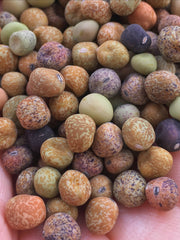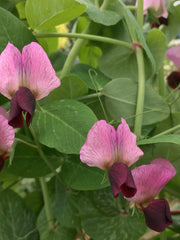Pea, Dry/Soup, 'Roveja'
*Ark of Taste Heirloom*
(Pisum sativum) We have a fascination with unusual legumes here at Uprising Seeds. Known as 'Roveja' in Italy, it has been grown for centuries in the rugged and harsh landscape of the Sibillini mountains in southeastern Umbria. Its taxonomy is not clear, but some consider this small wild pea to be an ancestor to the common pea, others a distinct species. Once a staple of the humble alpine cuisine of the region, it has recently reached a wider audience through a slow food presidium established to preserve and promote it. It is a truly gorgeous pea, multicolored and flecked with contrasting earth tones of browns, reds, blues, and greens. As a soup pea, it is hearty and flavorful with a delightful earthiness and almost fava-esque taste. In Umbria, it is also ground for flour to use in farecchiata also known as “polenta di roveja”. Plants vine to about 5', requiring trellising, and feature beautiful bicolor pink and purple blooms.
100-120 days. UO
Packet: 1oz (~110 seeds)
Availability: In stock
Growing Info
SOWING:
Seeds can be sown as soon as the soil can be worked in the early Spring. Some people try to push the season even earlier by sowing in flats indoors and transplanting, but we are not those kinds of people (peas don't love to be transplanted). Direct seeding is strongly recommended.
Note: Fully saturated cold soil can cause big fleshy seeds like peas to rot, so waiting for a dryish spell in regions that see a lot of precipitation in the early spring, (like here in the PNW) is recommended for good emergence. In our experience, purple speckled beige seeds such as this can withstand cool wet soil at germination better than more common green seeded varieties.
PLANTING DEPTH:
1/2-1"
SPACING:
6-8 seeds per linear foot (thinning further is not generally needed)
EMERGENCE:
5-14 days @ soil temp 50-75F
LIGHT:
Full sun to part shade
FERTILITY:
Low to medium. Peas (and other legumes) are able to produce their own usable nitrogen from atmospheric nitrogen through a symbiotic relationship with bacteria that colonize specialized nodules in their roots. Too much soil fertility can cause excessive vegetative growth at the expense of pod set. High nitrogen can also produce more disease susceptible plants.
ADDITIONAL NOTES:
It can be quite beneficial to mix pea seed with commercially available bacterial "inoculants" to encourage the beneficial symbiotic relationship in the growing plant's root nodules, especially if growing on ground that hasn't been planted with peas before. This can increase yields and improve plant health. In gardens or fields where peas have been grown regularly, there are often adequate populations of the beneficial bacteria already present and inoculant isn't necessary.
Provide a trellis for support.
Peas love cool weather! Avoid sowings that will mature in the heat of mid-late summer, as peas will quickly become starchy and tough.




